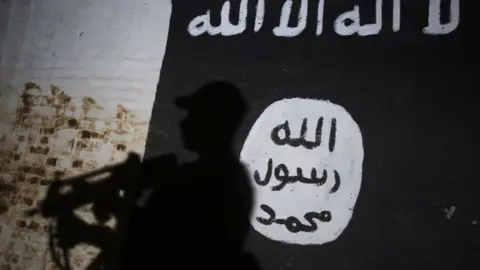Islamic State attack on army bus kills 33 Syrian soldiers
 Getty Images
Getty ImagesThe Islamic State (IS) group has claimed responsibility for an attack that killed at least 33 Syrian soldiers and wounded several others in eastern Syria on Friday.
The jihadists surrounded a military bus in eastern Deir al-Zour province before opening fire, the UK-based Syrian Observatory for Human Rights said.
More than 10 other soldiers were injured and dozens are still missing.
The attack has been described as the deadliest this year by IS militants.
Through the extremist group's own news outlet, Amaq, IS said its fighters had carried out an ambush "on two military buses", targeting them "with heavy weapons and rocket-propelled grenades" and setting one on fire.
The group vowed such attacks will continue.
Syria's Sana news agency quoted a military source saying that a "terrorist" group had attacked a military bus on Thursday in the Steppe desert on the road from the T2 pumping station - which lies close to the Iraqi border south of the city of Deir al-Zour - leaving a number of army personnel dead and injured.
The T2 pumping station was an IS stronghold until its capture by the Syrian army in 2017.
Earlier this week, 10 Syrian soldiers and pro-government fighters were killed in an IS attack in the former jihadist stronghold of Raqqa province, SOHR, a UK-based monitoring group, reported.
Other areas that have similarly come under IS attacks include Raqqa and Hama where activists documented the killing of 43 people, including government forces.
Since the beginning of August, IS members have increased their attacks in Syria's north and north-east, SOHR said. It added that the region had seen the "most violent" escalation in IS activities since it was "eliminated geographically".
IS once held 88,000 sq km (34,000 sq miles) of territory, stretching from north-eastern Syria across northern Iraq, and imposed its brutal rule on almost eight million people.
However it has lost vast swathes of territory since 2019 when the group was driven from its last stronghold.
The UN has warned that IS remains a persistent threat, however. Its militants still ambush and carry out hit-and-run attacks from hideouts in the Syrian desert.
The former suspected leader of the IS group in Syria, Abu Hussein al-Qurayshi, was killed by Turkish forces in April, the country's president said at the time.
Syria's war broke out after President Bashar al-Assad's government crushed the Arab Spring inspired peaceful protests in 2011.
More than half a million people have died and the conflict has forced half of the country's pre-war population from their homes.
